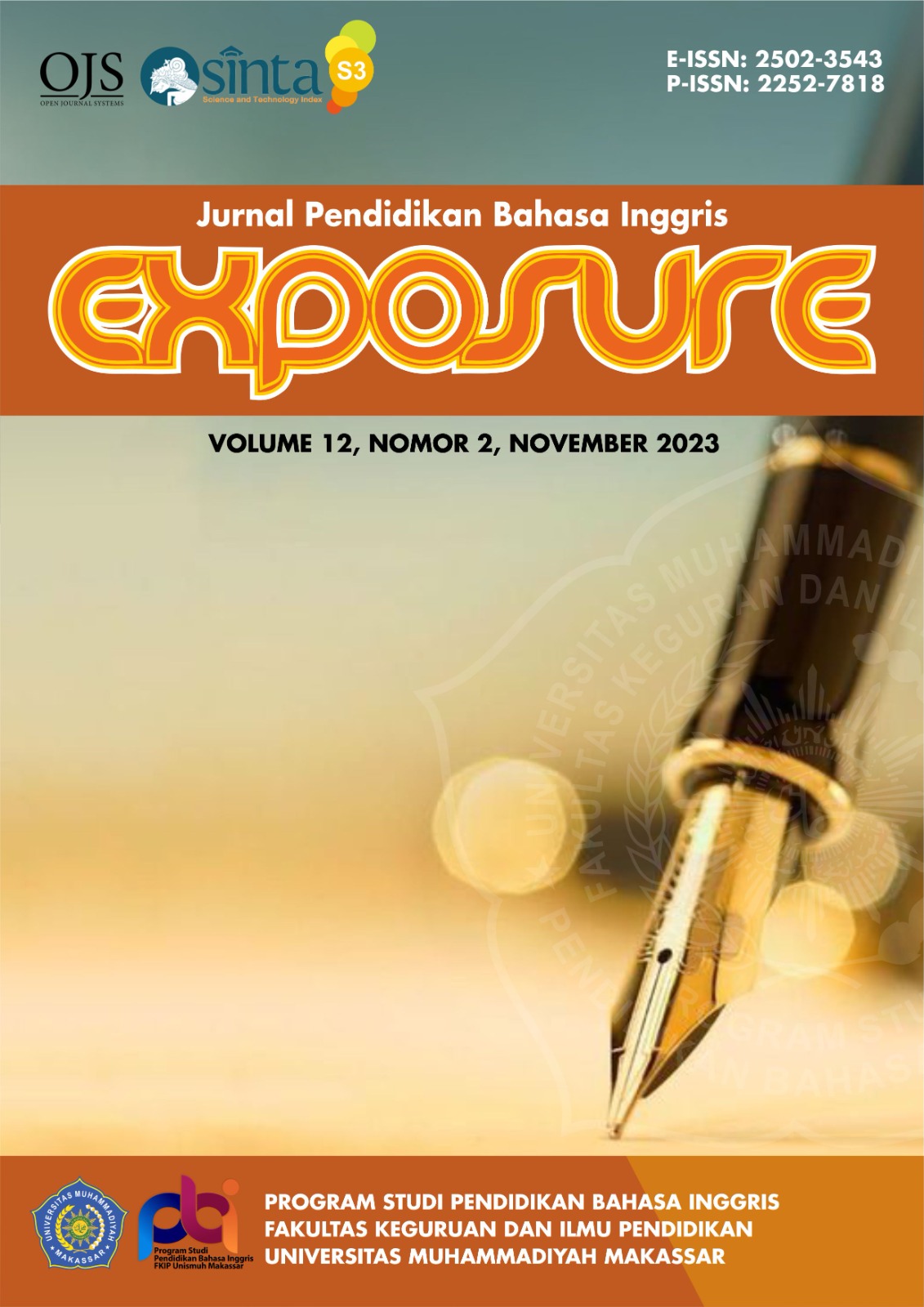EFFECT OF USING TONGUE TWISTER ON STUDENTS’ VOWEL PRONUNCIATION SKILLS AT UNIVERSITAS MUHAMMADIYAH BULUKUMBA; INDONESIAN VILLAGE LEARNER CONTEXT
DOI: https://doi.org/10.26618/exposure.v12i2.12762
Pronunciation, Tongue Twister, Technique, Error.
Abstract
Pronunciation is one of the speaking elements that must be mastered by foreign learners. However, students still found difficulties when pronouncing English words. Therefore, tongue twister was thought to be one effective technique to help students articulate the English words. The research applied pre-experimental design with only one experiment class. The class consisted of 15 participants from English Education Departement Program of Universitas Muhammadiyah Bulukumba and was chosen through purposive sampling technique. Statistical technique was applied to confirm the hypotheisis. Based on the test of significance result, it was found out that t test value is higher than the t table value (2.035>1.708). This indicates that students’ pronunciation skills improved after students learnt with tongue twister which was combined with some other methods. Furthermore, it is also informed that there were some kinds of pronunciation errors made and the dominant errors found is phonetic errors due to the effect of students’ native language systems.
References
Demirezen, M. (2006). The English [æ] and [ε] vowel sounds as fossilized pronunciation errors for the Turkish teachers of English and solutions to the problem. Journal of Language and Linguistic Studies, 2(2), 161-179.
Essien, A. M. (2021). Using Project Work to Strengthen Thai Students’ Learning Attitude toward English Language. Turkish Journal of Computer and Mathematics Education (TURCOMAT), 12(12), 1500-1508.
Gay, L. R. (2006). Educational Reseach. Colombus, Toronto, London, Sydney: Charles E Merril Publishing Co. A Bell & Howell Company.
Harmer, Jeremy (1988). The Practice of English Language Teachings. UK: Longman.
Hassan, E. M. I. (2014). Pronunciation problems: A case study of English language students at Sudan University of Science and Technology. English Language and Literature Studies, 4(4), 31. doi: 10.5539/ells.v4n4p31.
Lutfiani, D. (2017). Using tongue twister to improve students’ pronunciation. ELLITE: Journal of English Language, Literature, and Teaching, 2(2), 110-115.
Moulton, W. G. (1962). Toward a classification of pronunciation errors. The Modern Language Journal, 46(3), 101- 109.
Putri, D. S., & Rosa, R. N. (2020). An analysis of errors by the Third Year English department students in pronouncing English vowel. Journal of English Language Teaching, 9(1), 202-209.
Plailek, T. (2021). Pronunciation problems and factors affecting English pronunciation of EFL students. Turkish Journal of Computer and Mathematics Education (TURCOMAT), 12(12), 2026-2033.
Putri, N. S. E. (2018). EFL students’ perception towards IPA symbols as pronunciation learning system (Doctoral dissertation, IAIN Palangka Raya).
Richards, J. C. & Renandya, W. A. (2002). Methodology in language teaching: an anthology of current practice. Cambridge: Cambridge University Press.
Shak, P., Lee, C. S., & Stephen, J. (2016). Pronunciation problems: A case study on English pronunciation errors of low proficient students. International Journal of Language Education and Applied Linguistics. doi:
https://doi.org/10.15282/ijleal.v4.483
Seddighi, S. (2012). An account of Iranian EFL pronunciation errors through L1 transfer. Iranian Journal of Applied Language Studies, 2(2), 197-214. Doi: 10.22111/IJALS.2012.75
Thompson, T., & Gaddes, M. (2005). The importance of teaching pronunciation to adult learners. Asian EFL Journal, 2(1), 1-11.
Turumi, Y. L. Using Tongue Twister to Improve the Pronunciation of Grade VIII Students. e-Journal of ELTS (English Language Teaching Society), 4(2). 2338-1841
Putri, D. S., & Rosa, R. N. (2020). An analysis of errors by the third year English department students in pronouncing English vowel. Journal of English Language Teaching, 9(1), 202-209.
Downloads
Published
How to Cite
Issue
Section
License
Authors who publish with this journal agree to the following terms:
In order to assure the highest standards for published articles, a peer review policy is applied. In pursue of the compliance with academic standards, all parties involved in the publishing process (the authors, the editors and the editorial board and the reviewers) agree to meet the responsibilities stated below in accordance to the Journal publication ethics and malpractice statement.
Duties of Authors:
- The author(s) warrant that the submitted article is an original work, which has not been previously published, and that they have obtained an agreement from any co-author(s) prior to the manuscript’s submission;
- The author(s) should not submit articles describing essentially the same research to more than one journal;
- The authors(s) make certain that the manuscript meets the terms of the Manuscript Submission Guideline regarding appropriate academic citation and that no copyright infringement occurs;
- The authors(s) should inform the editors about any conflict of interests and report any errors they subsequently, discover in their manuscript.
Duties of Editors and the Editorial Board:
- The editors, together with the editorial board, are responsible for deciding upon the publication or rejection of the submitted manuscripts based only on their originality, significance, and relevance to the domains of the journal;
- The editors evaluate the manuscripts compliance with academic criteria, the domains of the journal and the guidelines;
- The editors must at all times respect the confidentiality of any information pertaining to the submitted manuscripts;
- The editors assign the review of each manuscript to two reviewers chosen according to their domains of expertise. The editors must take into account any conflict of interest reported by the authors and the reviewers.
- The editors must ensure that the comments and recommendations of the reviewers are sent to the author(s) in due time and that the manuscripts are returned to the editors, who take the final decision to publish them or not.
Authors are permitted and encouraged to post online a pre-publication manuscript (but not the Publisher’s final formatted PDF version of the Work) in institutional repositories or on their Websites prior to and during the submission process, as it can lead to productive exchanges, as well as earlier and greater citation of published work (see The Effect of Open Access). Any such posting made before acceptance and publication of the Work shall be updated upon publication to include a reference to the Publisher-assigned DOI (Digital Object Identifier) and a link to the online abstract for the final published Work in the Journal.














